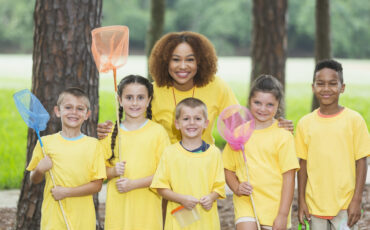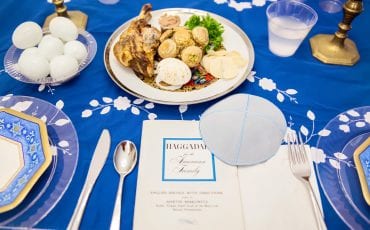Merry Christmas and Happy Hanukkah
 Holiday joy can be doubled when you choose to light the menorah and decorate the Christmas tree. I was raised Catholic and my husband is Jewish. We share the same beliefs about diversity, tolerance and spirituality, and that’s what we intend to pass onto our daughter. Here are a few tips based on what our family has learned about creating our own version of happy holidays.
Holiday joy can be doubled when you choose to light the menorah and decorate the Christmas tree. I was raised Catholic and my husband is Jewish. We share the same beliefs about diversity, tolerance and spirituality, and that’s what we intend to pass onto our daughter. Here are a few tips based on what our family has learned about creating our own version of happy holidays.
Table of Contents
Talk to Each Other First and Last
The bottom line on family celebrations, holiday or otherwise, is to do whatever you and your spouse deem best for your family. The only way to come to an understanding about what this means is to discuss it with each other. Be prepared for this to be an ongoing conversation, and probably one that you revisit each year.
Protect Your Joint Point of View
Never let bossy or opinionated family members horn in on conversations that rightly belong between you and your partner. Your spouse is the person whose opinion you should value most. Your kids come next and the grandparents after them. Don’t treat your parents like children or allow them to treat you like a child. This behavior will only create conflicts between you and your spouse.
Ignore Disapproving Outsiders
Never apologize for being an interfaith family, even if people in your extended family or circle of close friends do not approve of your union. You are not seeking their permission – as Perchick expressed so boldly in “Fiddler On The Roof” – you are asking for their blessing. Creating harmonious and joyful dual holidays in your own home is your parental right, even if it means agreeing to disagree with certain members of your extended family.
Stick to Separate But Equal
Christmas may be more commonly celebrated than Hanukkah, but don’t let that affect your holiday fun. The nice thing about Hanukkah is that it lasts for eight nights. Light the menorah candles and say the Hanukkah prayer every night, if you possibly can. You may be amazed at how moving and inspiring such simple rituals can be, even on busy school nights. Look for the quieter, more awe-inspiring moments in Christmas as well, such as ending the day admiring the beauty of the decorated tree and lights.
Keep Both Sets of Traditions
At our house, we celebrate as much of both traditions as we can, without a worry about whether the holidays overlap or not. For me, this means the Christmas tree, the presents, the cookies, the big dinner. For my husband, it means lighting two menorahs for eight nights (one for him and one for my daughter), enjoying potato latkes and some lively dreidel games.
Don’t Double Your Gift Budget
We make an effort to celebrate the bounty of two holidays without going overboard. If you are an interfaith family, your kids’ friends may consider them “lucky” because they assume that they get double the gifts every holiday season. That’s not necessarily the case at our house. Our daughter typically gets a little present on the first day of Hanukkah and a bigger present on the last day of Hanukkah. One set of grandparents send a couple of little Hanukkah gifts and a check; the other sends a couple of stocking stuffers and a check. The amount of gifts she receives is essentially the same as it would be if we only celebrated one holiday.
Share the Love
Another thing we enjoy about dual holidays is that our daughter can share traditions about both holidays with her friends, no matter what religion they follow, exposing them to a culture they may not have had the opportunity to learn about.
Participate Wisely
When invited to join a new or old tradition on either side of the family, give the ritual a chance. We will try just about anything once. But we reserve the right to say no to pressure or anything that makes us uncomfortable. Maintaining an atmosphere where you can say yes or no to your family without causing friction may not come easily, but start trying it, or you’ll never get there.
Honor the Choices of Others
We don’t try to protect our family members from our choices. They need to know what we value, if we expect them to understand and accept our choices. However, we also try to respect the choices that each of our family members make. The Jewish families get Hanukkah cards and the Christian families get Christmas cards. When we cross over, we go with “Happy Holidays.”
by Christina Katz
Holiday Family Reads



Hanukkah:
The Ninth Night of Hanukkah by Erica S. Perl (Sterling Children’s Books)
Hanukkah: The Festival of Lights by Bonnie Bader (Golden Books)
It’s A Miracle! A Hanukkah Storybook by Stephanie Spinner and Jill McElmurry (Aladdin)
The Littlest Candle: A Hanukkah Story by Rabbis Kerry and Jesse Olitzky (Kalaniot Books)
Christmas:
The Christmas Story by Jane Werner Watson and Eloise Wilkin (Golden Books)
‘Twas The Night Before Christmas or Account of a Visit From St. Nicholas by Clement Clarke Moore (Applesauce Press)
How The Grinch Stole Christmas by Dr. Seuss (Random House)
The Polar Express by Chris Van Allsburg (HMH Books for Young Readers)
Celebrating Both:
Eight Candles and a Tree by Simone Bloom Nathan (Beavers Pond Press)
Daddy Christmas and Hanukkah Mama by Selina Alko (Knopf Books for Young Readers)
My Two Holidays, a Hanukkah and Christmas Story by Danielle Novack (Cartwheel Books)
Light The Lights, a Story About Celebrating Hanukkah and Christmas by Margaret Moorman (Cartwheel Books)







